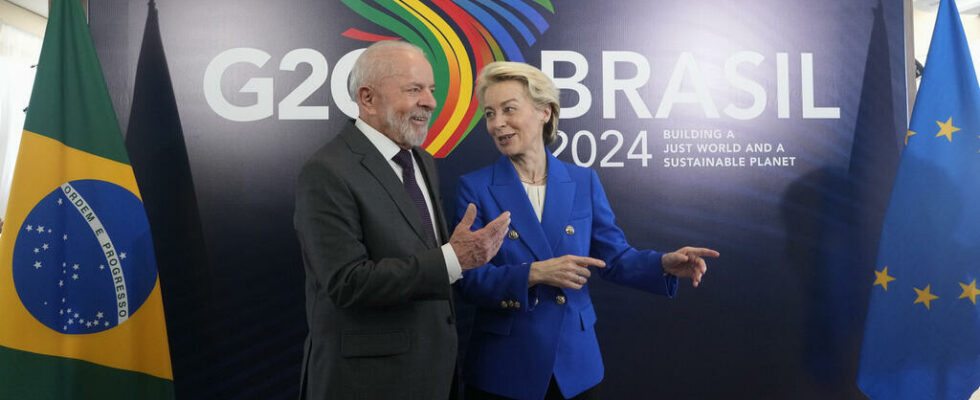The leaders of the G20 countries are meeting in Rio from Monday 18 until Tuesday 19 November to discuss reform of global governance, but also new resources to finance development and the energy transition. In a very tense economic and international context, Brazilian President Luiz Inacio Lula da Silva, host of the summit, will try to advance projects for global taxation of multinationals and taxation of billionaires.
4 mins
The first plenary session of the G20 will be dedicated to the Global Alliance against Hunger and Poverty, dear to the Brazilian President. The second will study how to further open up the shareholding of the IMF and the World Bank to emerging countries. The third session will be devoted to green finance, that is to say how to rationalize the multiple climate funds, a project launched by the Braziland how to create new resources.
There will once again be a question of taxing air and sea transport. But it is the taxation of multinationals which will be at the heart of the discussions – formerly called the Gafam tax, in reference to the digital giants Google, Apple, Facebook, Amazon and Microsoft. According to the French Ministry of the Economy, 98% of the compromises would be reached, but the remaining 2% – namely where to locate the benefits – are the hardest to achieve. Because the United States and India are among the hardest to convince.
Finally, this is the first time that the G20 will look at future global taxation of billionaires. How to combat harmful practices? Share information on heritage? This will be the start of a long process for the finance ministers of the G20, which will be chaired next year by South Africa.
“ Connection between the global south and the old world of old powers »
For Bertrand Badie, professor emeritus at Sciences Po Paris and specialist in international relations, “ we are tense around this American election, but the G20 presents much more important issues than the election of [Donald] Trump. The G20 is probably the only multilateral body that can act as a link between the “Global South” and the old world of the old powers. »
For this G20 in Rio, many countries have to gain, including the host country, Brazil. This is particularly pointed out by Hervé Théry, geographer, research director at the CNRS and professor at the University of São Paulo.
It is about restoring the image of Brazil as one of the spokespersons for the countries of the South, as a country that counts, and as a country at the forefront on environmental issues.
According to Hervé Théry, geographer and professor at the University of São Paulo, Brazil wants to “restore the image of one of the spokespersons of the countries of the South”, although the “social agenda is a little threatened”
“ It is a country which has always managed to manage its relationship with the West. It is truly a country of unity. And obviously, alongside President Lula, we will have to see how China behaves. We see that China is increasingly active, even on the Latin American continent », continues Bertrand Badie. Western countries have everything to lose by continuing to ignore this new international configuration.
Since the COP29NGOs will have their eyes glued to this summit, especially since Brazil must also host COP30 next year. “What particularly interests us is the question of the tax on the ultra-rich that Brazil intends to push and which would make it possible to raise the trillions we need to finance the transition [écologique] and adaptation », Explains Nicolas Haeringer, of the NGO 350.org.
Taxation of the ultra-rich, a theme that mobilizes Brazilian society
For the G20 summit which begins this Monday in Rio de Janeiro, one theme attracts attention and it is an ambitious proposal from Brazil: taxing the richest. This proposal mobilizes Brazilians, reports our correspondent in Rio, Sarah Cozzolino.
For some, it is an urgent social justice measure. Tamara is a student and native, who came from Brasília as part of the G20 social. “ It is absolutely necessary, because if today there are ultra-rich people, it is because they have exploited people. So the time has come to give back to those who have been exploited “, she assures.
The money raised by these taxes on the wealthy should be invested in the fight against climate change and for the victims of these phenomena, according to Bob, a human rights activist: “ People who pollute more have to pay more. The 10 % of the richest emit the 50 % of CO2 who pollutes the world. So, they have their responsibility. It’s not just about paying taxes, but they have to get involved, because they have their responsibility at the highest level », he judges.
But a large number of Brazilians doubt that the great powers will reach a common agreement. “ I think it’s more of an issue that we need to resolve internally, as a society. The G20 can serve as a starting point, but I think the discussion must take place at the level of the national Parliament “, says Caio, a nurse. By bringing these proposals within the framework of the G20, Brazilian President Lula wants to play a central role in the fight against inequalities.
[REPORTAGE] For Brazilians, taxing billionaires must be a priority
Also readBrazil: on the sidelines of the G20 in Rio, Chinese President Xi Jinping announces an official visit to Brasilia
